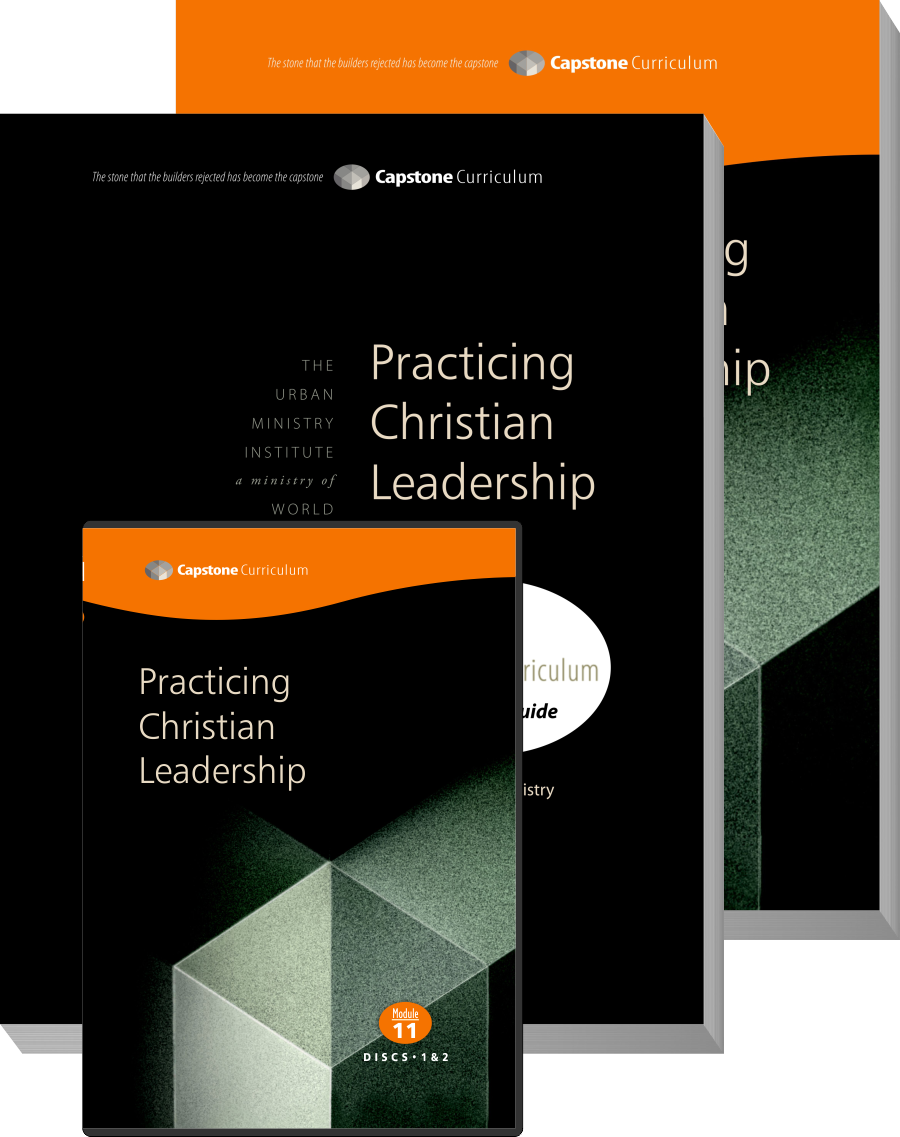 Module 11: Practicing Christian Leadership
Module 11: Practicing Christian Leadership
Perhaps nothing is more critical in the health of a Christian congregation than the practice of effective Christian leadership. God has raised up gifted men and women to care for his people, to exercise oversight that heals and blesses in the midst of his church. Truly, those called to lead demonstrate their devotion to the Savior by practicing a kind of leadership that both honors and glorifies our Lord and edifies and builds up his people.
This module specifically covers four critical dimensions of effective Christian leadership. We begin with a focus on effective worship leading, with a special focus on the role of ministering the Word and Sacrament among the people of God. We also consider the role of the Christian leader in Christian education, dealing specifically with how we welcome and integrate new believers into our community life together. In addition, we discuss the concept of spiritual parenthood, of raising healthy spiritual children and discipling them in the context of the local assembly of believers. Next, we focus on practicing effective church discipline, the lost art of biblical exhortation, and why this ministry is so necessary for Christian leaders among God's people. We close our study by considering the work of effective biblical counseling. Our goal is to understand both the therapeutic and pastoral implications of counseling and leading God's people as they encounter the darker side of life, and its trials, tribulations, and distresses.
Course Details
Lesson 1: Effective Worship Leading
Lesson 2: Effective Christian Education
Lesson 3: Effective Church Discipline
Lesson 4: Effective Counseling
Format
Mentor Guide: 289 page book
Student Workbook: 238 page book
DVD Set: approximately four hours of video
Title Page | Instructor | Copyright
Module Description
Practicing Christian Leadership
In Module 11 in our Capstone Curriculum series, entitled Practicing Christian Leadership we demonstrate our devotion to our Savior by practicing a kind of leadership that both honors and glorifies our Lord and edifies and builds up his people. We explore these important concepts and practices throughout this important study.
The first lesson, Effective Worship Leading considers the idea of representation of the Lord Jesus as fundamental in practicing every dimension of Christian leadership as his agents and servants. Closely connected to this important idea, we will also consider carefully the role of ministering the Word and Sacrament among the people of God. Throughout this lesson we will see how we as Christian leaders may lead God’s people to experience his grace and direction through an effective ministry of the Word of God and a faithful practice of the sacraments of the Church.
In our second lesson, Effective Christian Education, we will explore the idea of bringing new believers into our churches, dealing specifically with how we welcome and integrate new believers into our community life together. We will also explore the concept of parenting new Christians and discipling them in the Church. We will look carefully together at the meaning of spiritual parenthood, seeking to biblically define and practically outline how we can enable new and growing believers in the Lord to mature in Christ.
Next, lesson three deals with an important aspect of Christian leadership, Effective Church Discipline. The practice of Christian leadership involves our thorough knowledge of the principles of biblical exhortation, and here we will explore reasons why this ministry is so necessary for Christian leaders among God’s people. In this lesson we will also address the question of the practice of church discipline. We will look at both the biblical definitions and practical guidelines of godly rebuke and restoration in the context of God’s community.
Finally, in lesson four we will focus on Effective Counseling: Preparing, Caring, and Healing. Here we will define effective biblical counseling, starting with a general explanation of it and its implications for us as urban Christian leaders. Our goal will be to understand both the therapeutic and pastoral implications of counseling and leading God’s people. Together we will discover how we can become better care givers for those encountering the dark side of life, trials, tribulations, and distress. As God’s servants and under-shepherds of his people, we will discover how we may come to bear the burdens of those who are experiencing trouble or stress, and do all we can in order to edify the flock of God, even as he gives us opportunity.
What an adventure it is to serve the living God by caring for his dear people! My prayer for you is that you become that Christian leader God desires you to be, all for his glory!
Required Textbooks
The Capstone Curriculum
Capstone Curriculum is a 16-module training program, taught at a seminary level, which we specifically designed to serve as the most essential knowledge and skill learning necessary for effective urban ministry. Each module (course) comes with a Mentor’s Guide, a Student Workbook and two DVD’s (four hours of video).
![]() Each module also has required textbooks, and this graphic is linked to the reading assignments associated with those textbooks for that specific module.
Each module also has required textbooks, and this graphic is linked to the reading assignments associated with those textbooks for that specific module.
![]() Some modules have Suggested Readings that would enhance student learning. While these are not required assignments, they are included for further study if your students are interested.
Some modules have Suggested Readings that would enhance student learning. While these are not required assignments, they are included for further study if your students are interested.
![]() All of our Capstone Student Workbooks (English and Spanish) are available on Kindle and is a handy complement to your Capstone Students Softcover Workbook; the accessibility of the digital editions will be a lifetime resource for sermon preparation, Bible Study, and theological research. We are also seeking to make all of our required textbooks available on Kindle. If a book is available on Kindle, it will be linked to this icon in the book's description.
All of our Capstone Student Workbooks (English and Spanish) are available on Kindle and is a handy complement to your Capstone Students Softcover Workbook; the accessibility of the digital editions will be a lifetime resource for sermon preparation, Bible Study, and theological research. We are also seeking to make all of our required textbooks available on Kindle. If a book is available on Kindle, it will be linked to this icon in the book's description.
![]() A few textbooks are also available as audio books. The books that are will have this linked icon in its description as well.
A few textbooks are also available as audio books. The books that are will have this linked icon in its description as well.
![]() Two Capstone modules (Module 5: Bible Interpretation and Module 11: Practicing Christian Leadership) have reference texts that are phenomenal resources for any pastor or leader. This icon will alert you to those texts.
Two Capstone modules (Module 5: Bible Interpretation and Module 11: Practicing Christian Leadership) have reference texts that are phenomenal resources for any pastor or leader. This icon will alert you to those texts.
Reading Assignments
Reading Assignments
Each Capstone module has assigned textbooks which are read and discussed through the course. We encourage students to read, reflect upon, and respond to these with their professors, mentors, and fellow learners. Because of the fluidity of the texts (i.e., books going out of print), the required textbooks list will be different from what is listed in your Capstone Curriculum workbook. The textbooks list with each module is the OFFICIAL Capstone required textbook list.
![]()
Students: Part of our coursework requires that you purchase, read, and reflect upon the textbook(s) for the course. The assignment is to read each required textbook and write a precis (concise summary) of its main point, as you see it. Please summarize its major theme and argument, and then give your concise evaluation for each reading. Although the Student Workbook only shows space for two readings, the student must write a summary for each reading by using the back of the form. It is of utmost importance to us for our students to analyze a text, that is, to read it, understand its thesis (main point), articulate its argument in a respectful way (whether you agree with the author or not), and then respond as to why you agree or disagree with the thesis. This practice helps strengthen your ability to engage different opinions in a respectful way, and learn to listen to others and respond with clarity and respect. In this way, you learn to dialogue with and discuss with others whose beliefs are different than your own.
Mentors: The reading assignments below are keyed specifically to the lesson format of this module. Please note that, depending on how you are structuring your course sessions, you have complete flexibility to break up the reading assignments to match your actual class sessions. In other words, if you are running an eight week course, simply break up the reading assignments to match your sessions (see Appendix 8 in For the Next Generation, TUMI Mentor Manual for sample course schedule options). What is critical is that you focus on the lesson as the basic unit of teaching in your Capstone courses.
-
Lesson 1: Reading Assignments
By the conclusion of this lesson, you should have read the following:
World Wide Publications, The Billy Graham Christian Worker's Handbook, Intro, Steps to Peace with God - Drug Abuse
Carter, The Gifted Pastor, Intro, Chapters 1-3.
Cothen and Barlow, Equipped for Good Work: A Guide for Pastors, Chapters 1-5.
-
Lesson 2: Reading Assignments
By the conclusion of this lesson, you should have read the following:
World Wide Publications, The Billy Graham Christian Worker's Handbook, Employment, Loss of -Marriage (Winning One's Mate to Christ)
Carter, The Gifted Pastor, Chapters 4-6.
Cothen and Barlow, Equipped for Good Work: A Guide for Pastors, Chapters 6-10.
-
Lesson 3: Reading Assignments
By the conclusion of this lesson, you should have read the following:
World Wide Publications, The Billy Graham Christian Worker's Handbook, Mental Illness - A Comparison of Christianity with Major Religions and Cults
Carter, The Gifted Pastor, 7-11.
Cothen and Barlow, Equipped for Good Work: A Guide for Pastors, Chapters 11-16.
- 1
Kindle
Capstone is also available on Kindle and is a handy complement to your Capstone Students Softcover Workbook; the accessibility of the digital editions will be a lifetime resource for sermon preparation, Bible Study, and theological research.
Go to TUMIStore
Return to Capstone Summary Page
